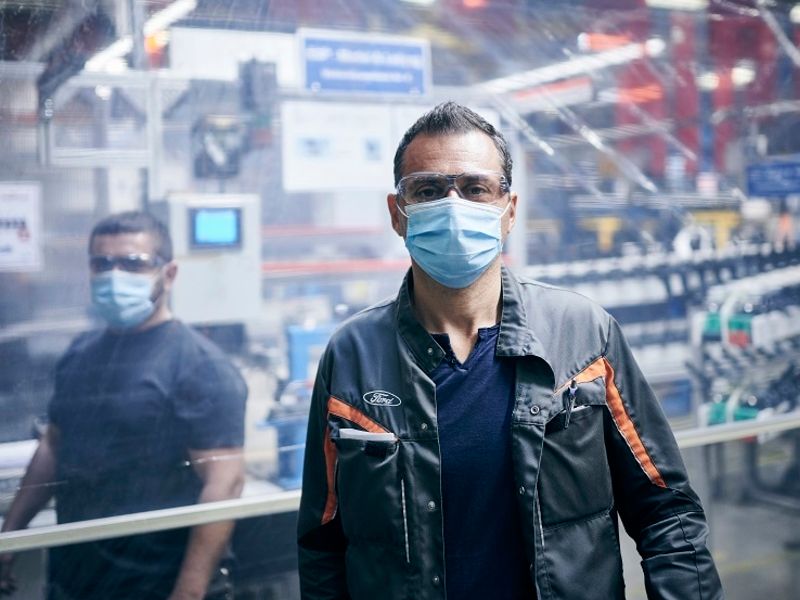
Wearing masks in public to slow the spread of the novel coronavirus has quickly become a staple in American life.
Should it be common in automotive advertising, too?
Donning masks is a polarizing issue in some circles, and it appears auto retailing is one of them. Ford has experienced this firsthand.
Matt VanDyke, Ford’s director of U.S. marketing, said some dealers aren’t ready to accept ad content with people wearing masks. Others think it’s important to show mask use.
“We shared with our dealer association groups some new creative that we have developed and literally about a third of the group said, ‘If you show people in the showroom of a Ford dealership and they don’t have a mask on, I can’t or won’t use it,’ ” VanDyke told Automotive News Publisher Jason Stein last week during the Congress Conversations series.
Other dealers argued that if Ford shows people in a showroom with masks on, it will scare their customers and won’t reflect what’s actually happening in their market.
“It really has created a challenge for us to get not just the tone of the advertising right, but literally just the visuals and how we treat it,” VanDyke said.
VanDyke was part of a marketing panel with Dean Evans, the former Subaru and Hyundai marketing boss who is now an executive vice president at Cars.com; Kimberley Gardiner, chief marketing officer for Mitsubishi Motors North America; and Derek Baker, consumer markets partner at PwC.
The panel addressed the mask issue, while delving into how marketers should move forward in a pandemic as vehicle demand returns and the economy recovers.
Baker said marketers need to start thinking about “the next horizon” and “be ready to address demand when the recovery returns.” Instead of pulling back on ads, now is the time for brands to gain a greater share of voice over competitors, he said.
“Media rates are an all-time low. Your target audiences are likely consuming content with increased engagement given the amount of time they’re at home,” Baker said. “Certainly, brands need to be cautious and rethink the type of messaging, but given the price of media inventory and the negotiating advantage that brands have, I think it really presents a great buying opportunity. I saw a stat recently that Kantar estimated that a six-month absence from TV will result in a 39 percent reduction in total brand communication awareness. I think that’s really tough to bounce back from.”
Baker said one of the questions brands should be asking themselves is how do they adapt to the rapid and dramatic change in behavior of consumers during the pandemic. He said COVID-19 has changed the experience of being a customer and a human, and that’s going to affect the way brands need to design, build and deliver the experiences that people need and want going forward.Baker said consumers are going back into showrooms “slowly but surely,” but he believes auto brands should embrace these changing needs and be able to meet their consumers where they are.
Gardiner said a one-size-fits-all approach to marketing won’t work these days, meaning brands will have to be about “audiences, not necessarily just about customers.”
“What I mean by that is, everybody’s needing something different,” Gardiner said. “If you need a vehicle now, we need to make sure that we’re there for you. If you’re looking to make a purchase, but it’s a little bit further down the horizon, we need to make sure that we nurture that conversation.”
Today’s rapidly changing marketing landscape, Gardiner said, will require flexibility.
“You’ve got to make sure that you have that balance,” she said. “Everyone wants a view to the long term; that’s how we do things in the auto world. We want a nice long-ranging plan, but at the same time so much is changing week by week. Even this past week has shown us that you’ve got to be flexible, and what I tell my team is have those playbooks long and deep so that we can pivot.”
Evans said dealerships should be wary of being on TV too much with “deals of the moment.” Dealers can still be aggressive, Evans said, but they have to push their messages on the right channels.
“We don’t think it’s probably smart to be on broadcast and watch the American public still probably question whether a car dealer should be an essential service,” Evans said. “So we just don’t want a lot of good that’s come of us as an industry saying we are essential to have any of that roll back because of too aggressive broadcast messaging.”